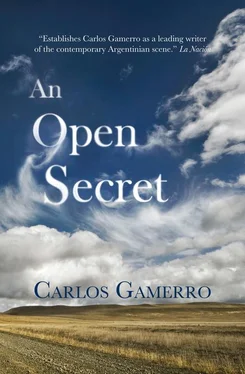“What became of Bermejo? Is he still around?”
“Uh-uh”—Guido shakes his head. “He opened a new place in Fuguet where there are enough brothels to deflect the sanctimonious wrath of the female congregation.”
“After that we’d move on to the vermouth and play a few hands of truco, it depended, if there was no show on at the lagoon we’d keep going till dinner — the lagoon hotel, of course, where else. At weekends there was always a tango orchestra belting it out or a quartet that could do the odd rock number, or sometimes even a Charleston or jazz band from Rosario. By the small hours the four of us’d invariably be round at Bermejo’s sucking on our private bottles and the slags we’d picked up down by the lagoon and when there weren’t any going Bermejo’d always come up with a bit on the side to peck at. The first ray of daylight was the sign to leave whatever the night had washed up, in the weeds or the back seat, or if there was any money and the chick was worth it, the mirrored room at the Mochica Motel, and the Torino or the Chevy burning rubber at ninety or a ton ten with the windows down and the cool dawn air clearing our hangovers, waving back at the farmhands and foremen riding their horses to the only brothel in Fuguet or the two or three in Toro Mocho, where there was never any shortage of girls so well-behaved you never needed to argue the toss even over the money. Unless Ezcurrita was around that is. They’d fight to be with him then.”
“You remember”—the recent arrival Jaimito Batata Sacamata is bellowing and roaring with laughter—“the time Nori or Dori or Flori — Titín’s cousin from Elordi, the one as married Kyke Brofman — was waiting for us in the front seat and Ezcurrita, who’d never seen her before, got in the back, tapped her on the shoulder and went Hi gorgeous, and the bag turned round and grinned at him?”
“Don’t say a word. You forgot your make-up”—Iturraspe revives the deceased’s quip. “No there was nobody faster than him. And that time we all boned that Otamendi girl? We cut for it and the lucky bastard got to go first as usual and when he comes out he tells me to fetch the razor blades and there’s me going What are you talking about you pillock and when I go in the sonofabitch’d left her face down for me on purpose, brother her back was so hairy I had to flip her over to make sure she wasn’t a truck-driver!” sighs Iturraspe wiping the tears from his eyes with his index finger and there’s me smiling in agreement and Guido nodding and Nene Larrieu leaning on the counter with his tin tray handy and a face that says he’s heard it all before.
“THE TOWN PLAYBOY he was, Malihuel’s very own Isidoro Cañones. Boy did I know Darío well. We were at high school together till they threw him out that is in second or third grade I think, can you remember Vicente?”
His brother interrupts a fork of spaghetti halfway to his mouth and stares wordlessly at him over the rim of his glasses as if to remind him that none of the elder brothers, set to work by their father at the age of thirteen, have had any access to higher education.
“What about you Celia?” he shouts over to the other end of the table and gives me a wink. But I realise from his tone that the question’s barbed.
“What?”
“Fefe wants to know about Ezcurra. You got anything to tell him?”
Celia smiles with her mouth only. Her eyes on the other hand seem to express puzzlement or pain. The years had tamed Celia. When I was still a boy she was capable of throwing a fit worthy of a cornered animal, smashing the empty plates she couldn’t serve until Ángel arrived, shrieking I want to get out I can’t stand it any more I’m dying in this shit hole and nobody cares, and from my place as a guest I’d watch Guido and Mati out of the corner of my eye while they stared autistically at their glasses of Coke, waiting with bovine patience for the storm to pass, which was never very long as Celia had to sweep up and wash her face before the return of her husband, who now insists:
“It’s the women in town that remember him best. Half of them because he didn’t let them get to the altar as virgins, the other half because he did”—his guffaw finds an echo in the wan smiles of his brother and his son Mati, who now asks me:
“Do you think the house looks any different?”
I find the change of subject annoying so I try not to elaborate.
“Well we didn’t have this room for a start when my grandparents lived here,” I say referring to the gallery of wood and glass they’ve built where the old fig tree used to stand. Murderers, I think to myself. “Then there’s the pool. The rest’s pretty much the same isn’t it? Grandma left you all her furniture didn’t she?”
“Well she couldn’t very well have taken it all to Rosario.” Mati defends himself as if I’ve accused him of something.
Maybe it’s something in my tone of voice; we don’t seem to get along as well as we used to. Luckily, after spearing and bolting down two balls of spaghetti, his father picks up the thread:
“Now they really hated his guts. Your grandparents I mean. Ezcurra. They used to cross the street to avoid him.”
I’ve just forked in the last mouthful of spaghetti— Number Three Pasta Nests I was told when served — so I can’t answer straight away, but by the time I finish swallowing I’ve been overtaken by a vision of the past, the first of many — perhaps too many — I’ll experience during my stay in Malihuel. I’m walking along the shaded side of the street holding my grandmother’s hand, playing at jumping from one broken flag to another without stepping on the grass, when I suddenly find myself being dragged into the blinding sunlight on the other side. Walking towards us is a smartly dressed young man who, clearly amused at the situation, directs a sardonic smile at my grandmother and, from beneath his raised sunglasses, a conspiratorial wink at me. I look up at my grandmother’s face and it’s flushed with rage, paralysed between the urge to lash out and the glaring vow never again to direct another word to the man whose white-clad back now recedes nonchalantly into the shadows he’s just made his. And my grandfather, that or some other day, slamming his fist on the lunch table and choking on his bean stew spluttering “That sonofabitch! He’ll get what’s coming to him that sonofabitch will!”
“Fancy a little more Fefe?” Celia’s voice startles me from behind.
“No, thanks, I’m full,” I tell her. So that was Ezcurra. I’m getting something now, a picture at least.
“Still eat like a bird I see. I remember that so clearly. You never did use to eat much and always put lots of salt on your food. Remember Papá how much salt he put on everything?”
“Do I? We used to have to fill the salt cellar every time he came to dinner,” Don Ángel slaps me on the shoulder. “Fefe you sonofagun, we thought we’d never see you again!”
“The stuff life throws at you eh?” I mumble idiotically while Celia clears the table with the help of Guido’s wife, and Mati’s wife cleans up her children’s mess, the youngest of whom asks her for the nth time that night, “Who’s that Mamá?” and she gives him an answer I never quite catch.
“What about the other one?” I say.
“Which other one?” Don Ángel comes back.
“The one who had him killed … or run out of town,” I add out of deference to Mati, who’s just back from the bathroom. “Who was he?”
“Old Rosas Paz?” he asks me as he sits down. “Owned half the county he did. His heirs have carved it up now. Didn’t you see their town on your way here? It’s the stop before as you come in from Rosario. Rosas Paz it’s called, just like them.”
I nod and insist:
Читать дальше












